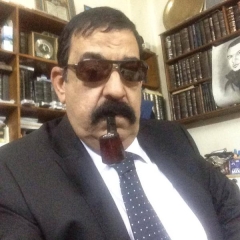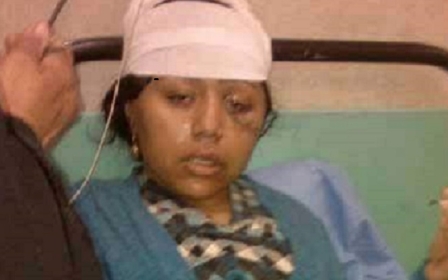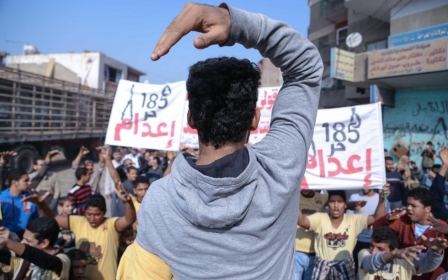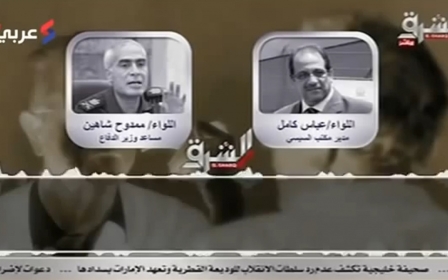Egypt's 'executioner judge' under pressure
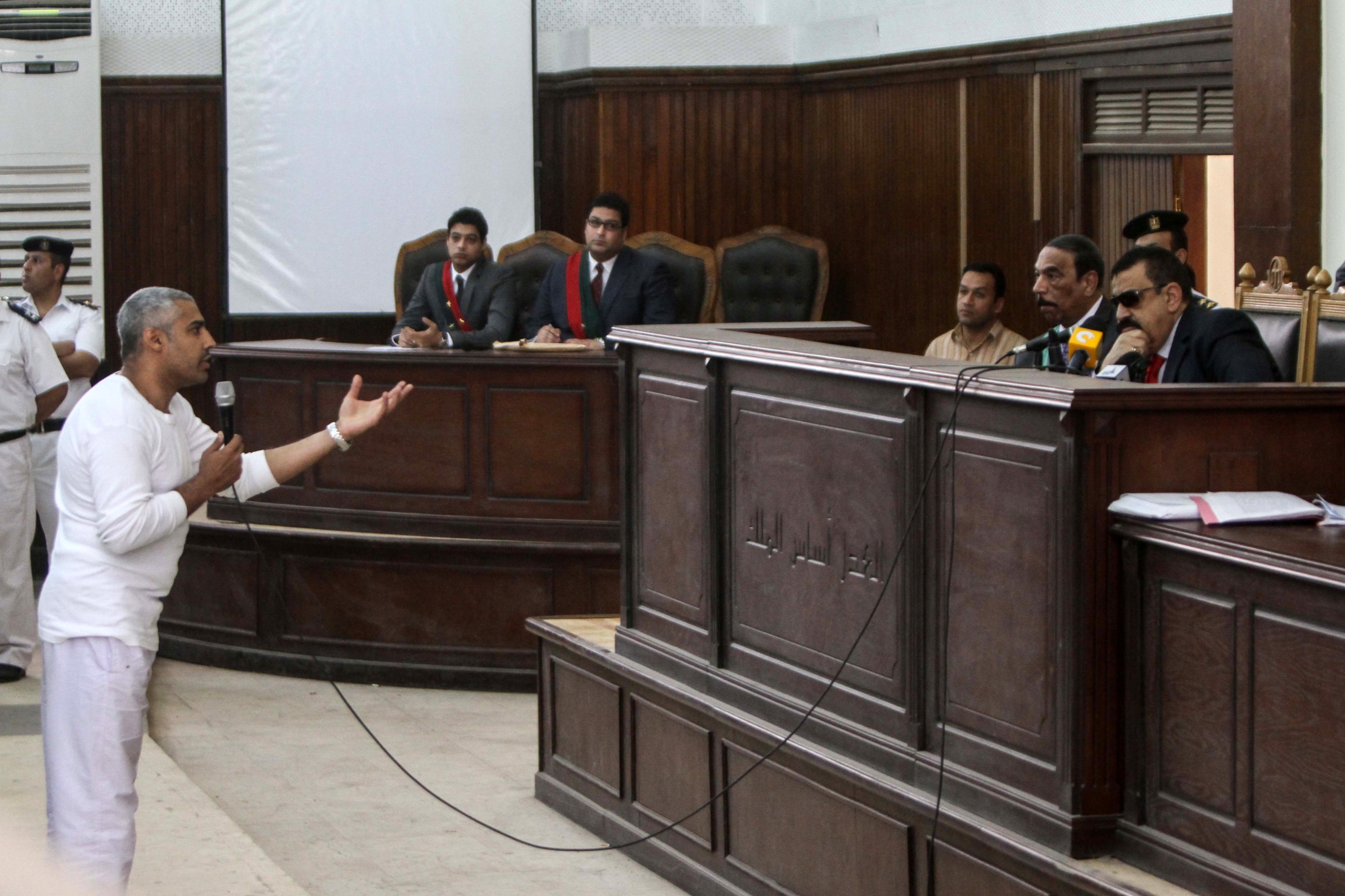
Mohammed Nagy Shehata had a busy time of it last week. Monday saw the Egyptian judge ratify a mass death sentence for 183 supporters of the outlawed Muslim Brotherhood. Less than 48 hours later he was back in court, sentencing 230 people to life in prison.
The eccentric judge, often found wearing dark sunglasses and smoking a pipe in court, has won his share of personal hate after a string of sentences dubbed “outrageous” and “politically-motivated” by Egyptian rights groups. The indelicately-named Facebook page “Mohammed Nagy Shehata: Pig of Egyptian Judges, Son of a Whore” has hundreds of likes, despite only being active for four months. The Lawyers’ Syndicate, Egypt’s oldest professional body, called for lawyers throughout the country to refuse to share a court-room with him in the now-infamous “Cabinet Clashes” case.
Though Shehata himself is becoming something of a celebrity for his controversial judgements, analysts suggest that his decisions are symptomatic of the difficult position the Egyptian judiciary finds itself in.
Despite the notoriety of the man known to his detractors as the “Executioner Judge,” personal details about Shehata are scant – nobody even seems quite sure when the veteran judge was born. Today, he presides over Giza’s Circuit Court Number 5, specialising in cases concerning “violence and terrorism”. Court photographs show him in a formal dark suit and muted tie. Outside the courtroom, Shehata opts for an open-necked shirt and gold chain, still sporting his customary dark glasses and bushy moustache.
Laundry list of controversy
Despite the dearth of information about him in the public eye, though, Shehata is certainly no stranger to the limelight. A look back at his recent rulings is as good as a run-down of the most controversial court cases in Egypt over the past years. Last Wednesday’s “Cabinet Clashes” case saw him sentence 230 people to life in prison over their alleged role in a 2011 sit-in during which police killed 17 protesters using live ammunition. Among those Shehata sent down was Ahmed Douma, a leading light of the uprising that toppled Hosni Mubarak, and Hind Nafia, whose stripping and beating by police during the demonstration shocked many after it was captured on camera. Nafia later said she had been sexually harassed by one of the witnesses, a police officer, as he testified in court.
A hearing two days earlier was the culmination of the notorious “Kerdasa Massacre” case. One-hundred and eighty-three people were sentenced to death for their alleged role in the murder of 16 officers during the storming of a local police station in the town of Kerdasa in August 2013. Autopsies found that the victims’ bodies showed signs of torture; images of the attack and its aftermath were beamed across the nation, holding Egyptian media in thrall for weeks afterwards.
On Monday, Shehata ratified the death sentences for 183 people – he had originally advised 185 sentences, but the court later discovered that two of those convicted had already died while waiting for the final hearing.
Earlier cases include the sentencing in 2014 of seventeen journalists, including three Al-Jazeera English employees, to between seven and 10 years for supporting a “terrorist organisation,” in reference to the now-banned Muslim Brotherhood, who decry the terror label as baseless and politically-motivated.
Shehata is also overseeing the trial of 52 Muslim Brotherhood leaders, including the organisation’s Supreme Guide Mohammed Badie, on charges of sowing chaos in the wake of the deposition of then-president Mohammed Morsi in July 2013. One of the defendants, Mohammed Soltan, has been on hunger strike for over 370 days, and is now slipping in and out of consciousness. Appeals for his release on health grounds have twice been rejected.
In June 2014, Shehata sentenced Badie and 13 other Brotherhood figureheads to death for inciting violence that killed five people in Giza in the summer of 2013. The country’s highest Sunni religious authority, the Grand Mufti, twice rejected the judgement, saying there was “no evidence” other than prosecution testimony from a police officer. In response, Shehata sentenced Badie and seven co-defendants to life in prison, while also issuing death sentences in absentia for six others who had fled the country.
Celebrity judge
Shehata’s involvement in these trials, described by veteran Egyptian journalist Mu’taz Matr as Egypt’s “five most important court cases,” has left him approaching celebrity status.
With fame inevitably comes scandal, and Shehata is no exception. In May 2013, just before the spectacular toppling of Morsi, then-Justice Minister Ahmed Suleiman accused Shehata and 21 other judges of rigging the 2005 parliamentary elections. Shehata has never responded to the allegations.
Shehata has said publicly that, in his role as an Egyptian citizen, he supports President Sisi. He did not say whether he also supports Sisi in his role as an Egyptian judge. But his sentencing record, according to Egyptian analyst Sohaib Hassan, “reflects his attitudes”.
“His name is mentioned time and time again when it comes to controversial cases. He seems to be ambitious, and he is putting out a message to people that certain things are not accepted by the state," Hassan said.
In recent months Shehata has been grabbing headlines for his judgements, but also for his outspoken public statements. After sentencing, he famously accused the Al-Jazeera trio of being urged on by “the devil”. Last week, explaining his reasons for giving Ahmed Douma an extra three years in prison for asking whether the judge had a Facebook page, Shehata was defiant: “personal insults are a red line for me”. Asked about his decision to sentence 183 people to death by hanging on Monday, the defiant judge said “there was mass killing [during the 2013 siege] – so why do people cry out when the judgements are also handed down en masse?”
Shehata’s sentence was condemned as “outrageous” by Amnesty International. After life sentences against 230 activists were passed two days later, a group of 17 Egyptian organisations issued a statement expressing their “grave displeasure” at the judgement. A spokesperson for the Egyptian Centre for Economic and Social Rights (ECESR), one of the statement’s signatories, told MEE the ruling was “to be expected given the judge’s history”. ECESR and a group of lawyers are now launching a legal challenge against Shehata over his “questionable impartiality”.
Judiciary under strain?
The impartiality or otherwise of the Egyptian judiciary in general has come into question over recent months, in light of heavy sentences imposed on thousands of supporters of the now-outlawed Muslim Brotherhood. Some, including the Brotherhood, allege that sentences like those handed down by Shehata are politically motivated, and far too stringent. But others, analysts say, are keen to see justice meted out, as Egypt struggles to get back onto its feet after years of unrest that have shaken the country to its core and left its economy debilitated.
“The judiciary in Egypt are in an extremely difficult position,” Sohaib Hassan told MEE - and that strain could be showing in Shehata’s controversial judgements.
“People affected by his sentences say they are too harsh. But a lot of people in Egypt are calling for even harsher sentencing. The judiciary has to toe a very difficult line to keep both groups satisfied”.
According to Hassan, many of Shehata’s most contentious sentences are designed to prove that “political protests of an Islamist nature and attacks against police officers or the military will result in a death sentence”. Many of them, he says, have since been commuted to life in prison after the intervention of the Grand Mufti, who according to Egyptian law must sign off on all such judgements.
But many feel that judgements like Shehata’s cause very real suffering, whether intended as a deterrent or not. Mohammed Soltan, after 300 days of hunger strike against his continued detention, said he was living a “dark and gloomy nightmare” in Cairo’s infamous Tora Prison, where authorities “regularly violate prisoners’ rights” according to former inmate Peter Greste.
Egypt’s judiciary may have little stomach for actually carrying out mass death sentences, according to Hassan, but the religious establishment showed last week that the tide may be turning there. Last Wednesday, clerics from al-Azhar, the country’s most prestigious religious establishment, marched alongside the Minister of Religious Endowments to declare that, according to their colourful banners, “the army, the police and the clerics are one hand”.
On the same day Shawki Allam, Egypt’s Grand Mufti, addressed President Sisi directly in a statement, saying “God chose you…to lead the nation to victory”. He also urged all Egyptians to “come together behind our leaders and our army”. Two days earlier, Allam had finally signed off on a mass death sentence for the 185 people convicted of involvement in the Kerdasa Massacre.
The decision, says Hassan, marks the beginning of “a new era” for Egypt’s courts.
New MEE newsletter: Jerusalem Dispatch
Sign up to get the latest insights and analysis on Israel-Palestine, alongside Turkey Unpacked and other MEE newsletters
Middle East Eye delivers independent and unrivalled coverage and analysis of the Middle East, North Africa and beyond. To learn more about republishing this content and the associated fees, please fill out this form. More about MEE can be found here.


